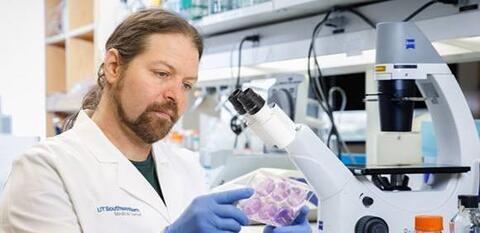2022 SCEP Symposium Archive
Keynote Speaker
Jude Uzonna, Ph.D., D.V.M.
"Immunologic memory in parasitic infections may need constant reminding:
a paradigm change?"
Biography
Dr. Uzonna obtained his Doctor of Veterinary Medicine (DVM) degree with distinction from the University of Nigeria and a Ph.D. degree from the Western College of Veterinary Medicine, University of Saskatchewan. He did his postdoctoral fellowship training at the University of Pennsylvania, Philadelphia. He is a Professor in the Departments of Immunology and Medical Microbiology and currently the Associate Dean (Research) at the Max Rady College of Medicine, Rady Faculty of Health Sciences, the University of Manitoba. He was a Canadian Institutes for Health Research (CIHR) New Investigator and Research Manitoba Chair Professor in Infection and Immunity.
Dr. Uzonna’s research program (which is currently funded by CIHR and Natural Sciences and Engineering Research Council [NSERC]) focuses on understanding the cellular and molecular mechanisms that regulate immunity to infectious diseases, particularly those caused by protozoan parasites. He is particularly interested in unravelling host and parasite factors that regulate induction, maintenance and loss of protective immunity, with a view to exploiting the information gained from these studies for the development of effective vaccines and vaccination strategies against diseases caused by protozoan parasites. In addition, he is interested in understanding the immunomodulatory mechanisms that regulate the pathophysiology of sepsis and septic shock.
Dr. Uzonna has received numerous professional, academic, teaching, research and community awards, including the Canadian Society for Immunology (CSI) Investigator Award, CIHR New Investigator Award, Ken Hughes Award for Outstanding Achievement in Biomedical Research, Faculty of Graduate Studies Outstanding Mentorship Award and The Manitoba Black Community Award for Outstanding Achievement in Mentorship and Education. He is (or has served as) a member of editorial board or guest editor for many journals including, The Journal of Immunology, Infection and Immunity, Frontiers in Immunology, Immunology and Cell Biology, PLoS Pathogens, etc. He has extensive grant review experience and is currently a member of the CIHR Microbiology and Infectious Diseases Panel. He is currently a member of the Advisory Board of the CIHR Institute of Infection and Immunity and has mentored many trainees who are currently working in various fields including research, academia, and biotechnology.
Research Summary
Dr. Uzonna’s primary research program focuses on understanding cellular and molecular mechanisms that regulate the induction, maintenance and loss of protective immunity against parasitic infections, particularly those caused by protozoa, with a view to exploiting the information gained from these studies for the development of effective vaccines and vaccination strategies against these infections.
In addition, he is also interested in understanding the immunomodulatory mechanisms that regulate the pathophysiology of systemic inflammatory response syndromes, particularly those associated with sepsis and septic shock.
UZONNA FACULTY PROFILE
Featured Publications

SCEP Speaker
Michael Reese, Ph.D.
Associate Professor, Department of Pharmacology and Biochemistry
"Using cryo-electron tomography to define the in situ structure the apicomplexan invasion machinery"
Biography
Dr. Michael Reese received a B.S. degree in Molecular Biophysics & Biochemistry from Yale University in 1998. While at Yale, he worked in the laboratory of Dr. Axel Brunger on structural studies of mammalian vesicular transport proteins (SNAPs and SNAREs). After Yale, Dr. Reese spent two years teaching high school science to gifted students with learning disabilities.
Dr. Reese received a Ph.D. in Biophysics in 2006 from the University of California, San Francisco, where he worked jointly in the laboratories of Dr. Frances Brodsky and Dr. Volker Doetsch on the structural basis for the activities of proteins involved in protein trafficking and neuronal signaling. During his postdoctoral work with John Boothroyd at Stanford University, he made the surprising discovery that a family of catalytically inactive kinases, or pseudokinases, are essential to Toxoplasma's ability to cause disease in mice. Dr. Reese went on to demonstrate that these pseudokinases are allosteric inhibitors of the immune-related GTPases, which are critical for the control of a variety of intracellular pathogens.
In the fall of 2013, Dr. Reese joined the faculty in the Department of Pharmacology at UT Southwestern. His lab is focused on determining the many mechanisms by which the ubiquitous intracellular parasite, Toxoplasma gondii, co-opts the signaling networks of its host organisms.
Research Summary:
The Reese laboratory combines techniques from multiple disciplines: from classical and molecular genetics and cell biology to biophysics and structural biology. This allows the examination of problems at many levels, from the atomic order structures of protein-protein complexes to the analysis of the signatures of evolutionary competition written in the genomes of the parasite and its hosts.
REESE LAB WEBSITE
Featured Publications:
SCEP Symposium Schedule
| 8:30-9:00am |
Breakfast and Registration (Genomics Auditorium)
Poster set-up (Entomology Courtyard)
|
| 9:00-9:05am |
Welcome to 12 years of SCEP
Opening remarks for the 12th Annual SCEP Symposium
|
| 9:05-9:35am |
Morning Session Chair, Dr. Emma WilsonGuest speaker, Michael Reese, Ph.D., Associate Professor, UT Southwestern “Using cryo-electron tomography to define the in situ structure the apicomplexan invasion machinery” |
| 9:35-9:50am |
Ashley Ramirez (Mercer Lab)
"FcYRIIa plays a role in neutrophil trogocytic killing of Trichomonas vaginalis"
|
| 9:50-10:05am |
Breanna Walsh (Hallem Lab)
"Elucidating the molecular and neural basis of oxygen sensation in Strongyloides stercorolis"
|
| 10:05-10:20am |
Izra Abbaali (Morrissette Lab)
"Is Resistance Futile?: β-tubulin Drug Targets in a Protozoan Parasite"
|
| 10:20-10:35am |
Katherine Yanes (Lodoen Lab)
"Toxoplasma gondii induces microglial activation and amyloid reduction in Alzheimer’s disease"
|
| 10:35-10:50am |
BREAK
|
| 10:50-11:05am |
Sebastian Mesones Mancilla (Jimenez Lab)
"Establishing the role of the mitochondrial voltage-dependent anion channel (VDAC) in Trypanosoma cruzi"
|
| 11:05-11:20am |
Simon Groen (Groen name)
"Why you should eat wasabi with your sushi"
|
| 11:20-11:35am | Zeinab Chahine (Le Roch Lab) "A multi-omics platform to understand the mechanisms of action of Kalihinol as potent new antimalarial" |
| 11:35am-11:50am |
Stephanie Orchanian (Lodoen Lab)
"Deficiency in astrocyte CCL2 production reduces immune cell infiltration and host defense in the CNS during chronic, but not acute, Toxoplasma gondii infection"
|
| 11:50am-12:00pm | BREAK and SQUEEZE UP! |
| 12:00-1:00pm |
Keynote Introduction, Dr. Meera NairKeynote Speaker, Jude Uzonna, Ph.D., D.V.M., Associate Dean (Research) and Professor of Immunology & Medical Microbiology at Max Rady College of Medicine, University of Manitoba “Immunologic memory in parasitic infections may need constant reminding: a paradigm change?" |
| 1:00-2:15pm | Lunch and Poster Viewing (Entomology Courtyard) |
| 2:15-2:30pm |
Afternoon Session Chair, Dr. Meera NairJustin Quan (Bradley Lab)
"Toxoplasma gondii encodes an array of novel TBC-domain containing proteins including an essential regulator of the secretory pathway"
|
| 2:30-2:45pm | Harpal Dhillon (Dhillon Lab) "Nematode venom: A new perspective for insect control" |
| 2:45-3:00pm | George Tseng (Hill Lab) "Fcy-receptors and the immune defense against Trichomonas vaginalis" |
| 3:00-3:15pm | Xian Xia (Hill Lab) "Structure of doublet microtubules from the pathogen Trypanosoma brucei reveals unique features of flagella-associated proteins" |
| 3:15-3:30pm | Zoe Figueroa (Wilson) "Chronic Toxoplasma infection induces a conserved pattern of astrocyte heterogeneity" |
| 3:30-6:00pm |
Drinks and Nibbles (Entomology Courtyard)
Poster presentations (odd numbers 3:45-4:30pm; even numbers 4:30-5:15pm)
Announcement of abstract awards and networking (5:15-6:00pm) |
